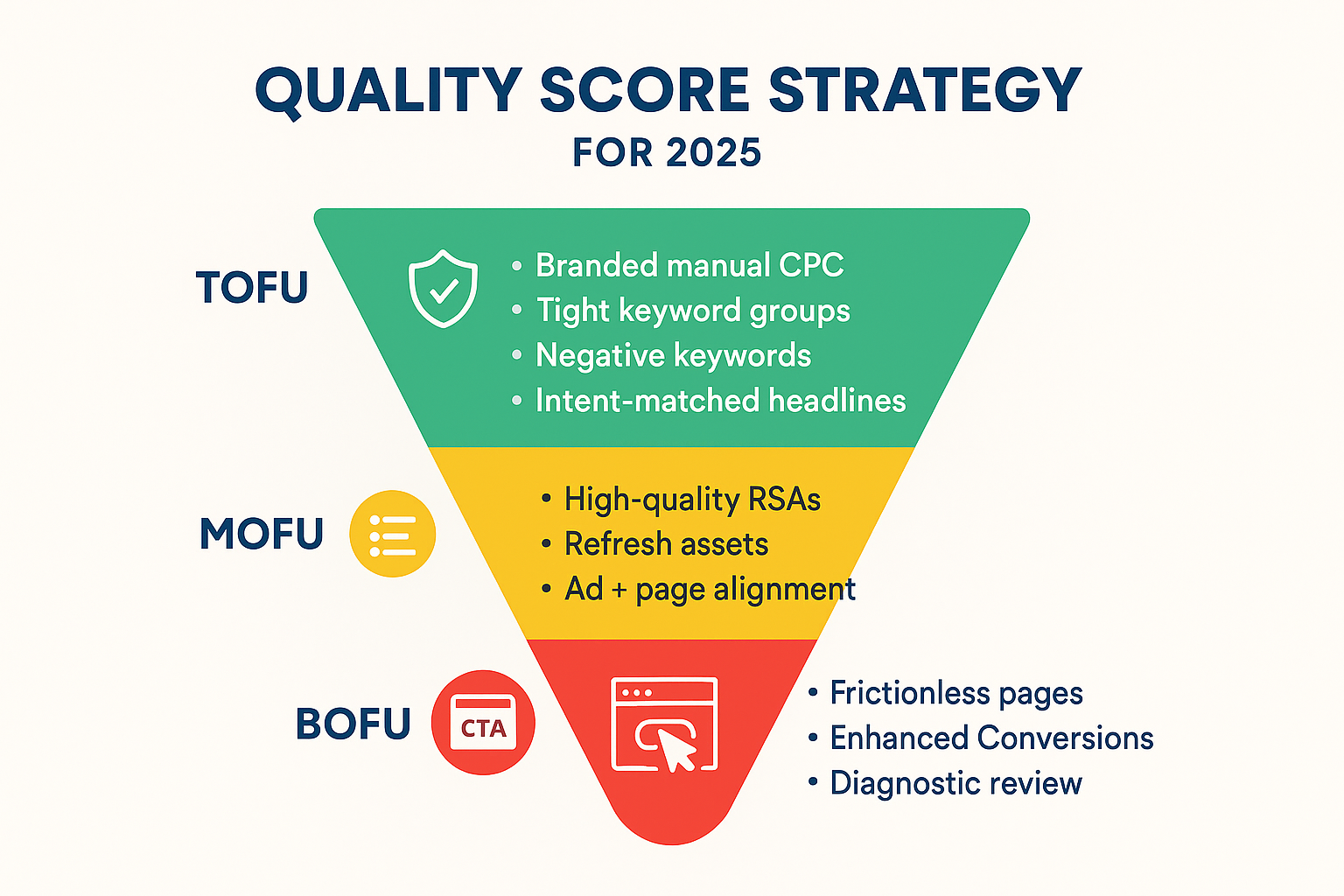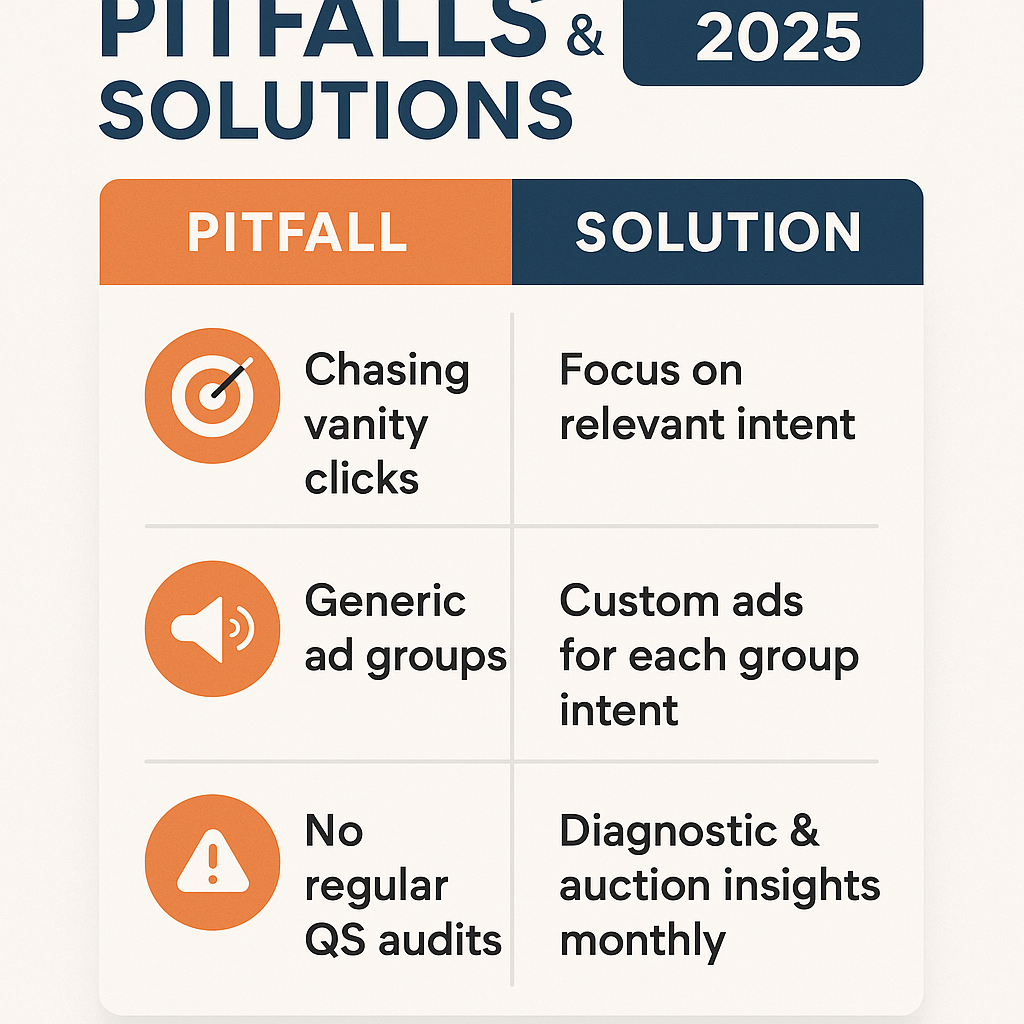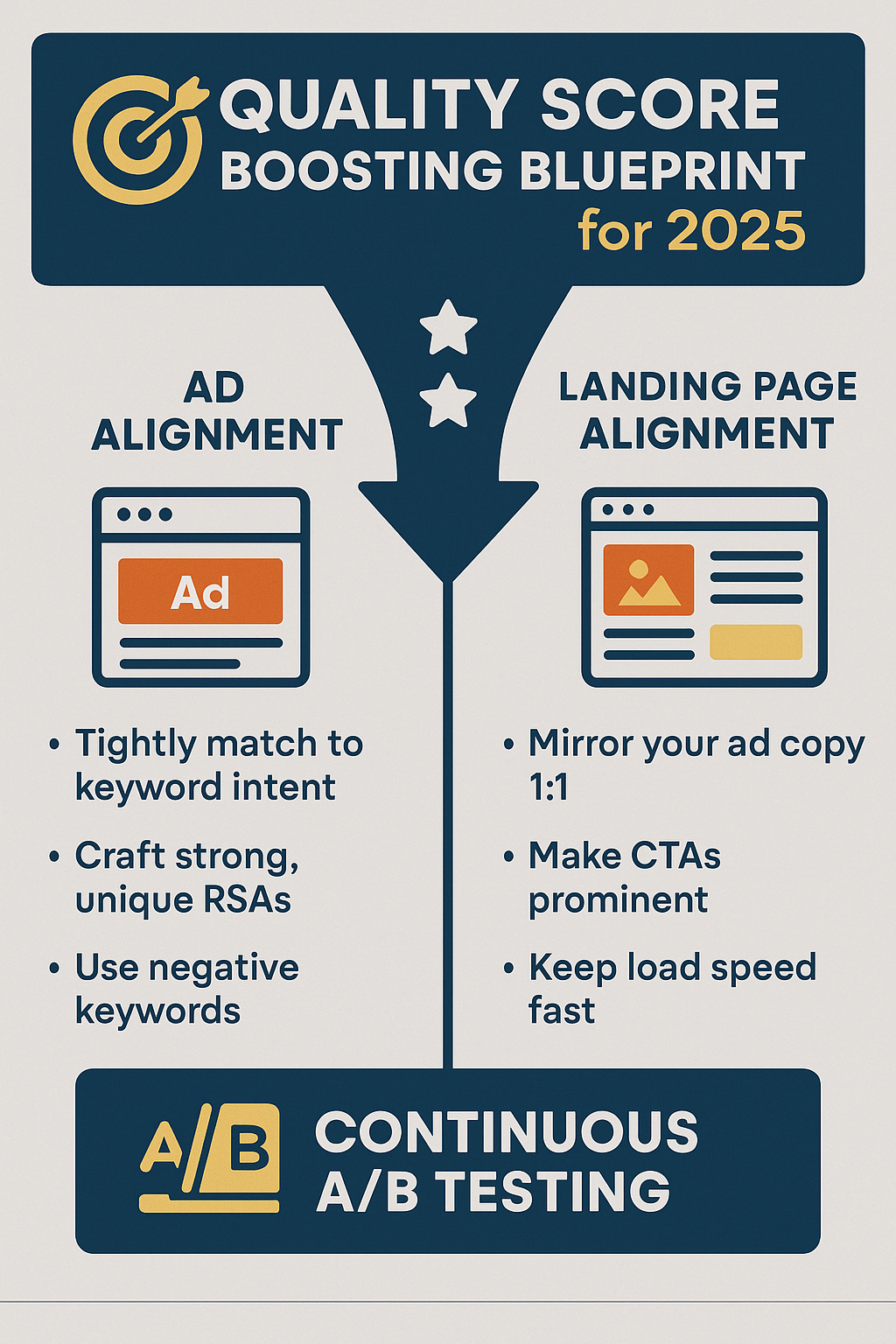Google Ads Quality Score Optimization for 2025: The Small Business Playbook
If you're a small business tired of agencies that run your ads without fixing the root cause of high costs — this guide is for you. In 2025, Google Ads Quality Score (QS) isn't just a metric; it's the gateway to lower CPCs, higher ROI, and smarter AI bidding.
🎯 Why Quality Score Still Matters in 2025
- ✅Google's AI-driven Smart Bidding incorporates QS to determine ad rank and CPC.
- ✅A high QS means you pay less for better placements.
- ✅A low QS = higher CPC, worse placements, wasted budget — no matter how smart your bidding strategy.
👉 Think of QS as your ad's credit score — bad score = higher costs, lower results.
💡 Quality Score in the AI Era
Here's what many agencies don't tell you about Quality Score in 2025:
- 🤖 AI Integration: Smart Bidding algorithms factor QS into every auction decision
- 🎯 Compound Effect: Higher QS improves ad rank, which improves CTR, which improves QS further
- 💰 Cost Impact: A jump from QS 3 to QS 8 can reduce CPC by 50% or more
- 🚀 Scale Enabler: Better QS allows more aggressive bidding with maintained profitability
🚀 The Funnel-Aligned Quality Score Strategy

🟢 TOFU: Build Relevance and Block Waste
- Use Manual CPC for branded search terms → control CPC, protect budget.
- Focus on tightly grouped, intent-aligned keywords (exact/phrase match over broad).
- Aggressively build negative keyword lists.
- Ensure headlines match search intent precisely.
🟡 MOFU: Strengthen Ad Relevance + Landing Experience
- Craft RSAs with distinct, high-quality headlines (no keyword stuffing).
- Refresh low-rated assets monthly.
- Align ad copy and landing page 1:1 (speed, content match).
🔴 BOFU: Optimize for User Satisfaction + Conversion
- Make landing pages frictionless — clear CTAs, minimal forms.
- Enable Enhanced Conversions → AI learns from true conversions, lifting QS.
- Run regular Diagnostic reviews to spot low CTR, ad relevance, or landing experience issues.
✅ Advanced Quality Score Tactics
- Single-intent ad groups: Each ad group serves one clear intent — boosts relevance.
- Dynamic Keyword Insertion (use cautiously): Improve relevance where appropriate.
- Site speed & mobile UX: Direct impact on landing page experience component.
- A/B test headlines, descriptions, and pages continuously.
🎯 The 3-Pillar QS Optimization Framework
📊 Expected CTR
- • Tight keyword grouping
- • Strong negative keywords
- • Intent-matched headlines
- • Historical performance data
🎨 Ad Relevance
- • Keyword in headline
- • Message-match consistency
- • Unique value propositions
- • Strong CTAs
🚀 Landing Page Experience
- • Sub-3 second load time
- • Mobile optimization
- • Content relevance
- • Easy navigation
Quality Score Audit & Improvement Process
Monthly QS Health Check:
- 1. Performance Review: Identify keywords with QS below 7
- 2. Component Analysis: Check Expected CTR, Ad Relevance, Landing Page Experience
- 3. Keyword Relevance Audit: Remove or restructure irrelevant keywords
- 4. Ad Copy Refresh: Update low-performing ad assets
- 5. Landing Page Optimization: Fix speed and relevance issues
- 6. Negative Keyword Expansion: Block irrelevant traffic
- 7. Monitor & Iterate: Track improvements over 14-30 days
⚠️ Pitfalls + Solutions
| Pitfall | Solution |
|---|---|
| Agencies chase CTR at expense of relevance | Focus on aligned intent, not vanity clicks |
| Generic landing pages | Custom pages for each ad group intent |
| No regular QS audits | Monthly reviews of ad strength, Diagnostic tools, auction insights |

Advanced Quality Score Optimization Techniques

🔍 Keyword-Level Optimization
- Intent Mapping: Group keywords by exact user intent
- Match Type Strategy: Use exact match for high-intent terms
- Search Query Mining: Find irrelevant queries to negate
- Seasonal Adjustments: Pause irrelevant keywords during off-seasons
📱 Mobile-First QS Strategy
- Mobile Page Speed: Core Web Vitals optimization
- Thumb-Friendly Design: Easy tap targets and forms
- Mobile-Specific Copy: Shorter headlines, clear CTAs
- Location Extensions: Boost local relevance scores
⚠️ Quality Score Myths Debunked
- Myth: "Higher bids improve Quality Score" → Reality: Relevance matters more than bid amount
- Myth: "QS doesn't matter with Smart Bidding" → Reality: AI uses QS to optimize auction participation
- Myth: "QS is just about CTR" → Reality: Landing page experience is equally important
- Myth: "Broad match hurts QS" → Reality: Poor negative keyword management hurts QS
Quality Score Optimization Tools & Workflows
Essential QS Monitoring Setup:
📊 Google Ads Native Tools
- • Keyword-level QS columns
- • Performance Diagnostics
- • Ad Strength indicators
- • Auction Insights reports
🔧 Third-Party Solutions
- • Google PageSpeed Insights
- • GTmetrix for landing pages
- • SEMrush for competitive QS
- • Optmyzr for QS automation
🚨 Critical Warning: Don't Chase QS for QS Sake
Some agencies obsess over perfect Quality Scores while ignoring actual business results. A QS of 6-7 that drives profitable conversions is better than a QS of 10 that attracts irrelevant traffic. Always optimize QS in service of your real business goals, not as a vanity metric.
🔗 Internal Links
⚡ Final Thoughts
In 2025, Quality Score is the hidden lever that makes AI bidding work smarter — or bleed your budget. At OnlyDeb, we help small businesses build campaigns that lift QS, lower CPC, and scale profitably. Let's improve yours.
Ready to boost your Quality Score?
Get a free Quality Score audit and optimization roadmap.